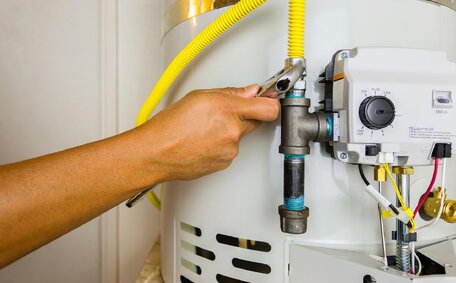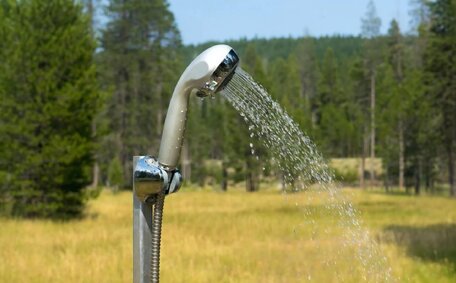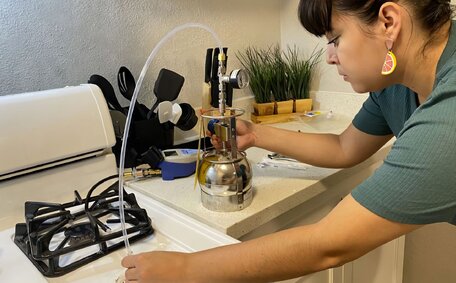The dangers of gas leaks
Gas leaks are hazardous and demand urgent action. The main risks associated with gas leaks are:
- Fire and Explosion - Though efficient, the flammability of natural gas necessitates strict safety protocols in Australian households. A gas leak can occur unexpectedly and cause a devastating fire or explosion if ignited by a spark or flame.
- Asphyxiation - Gas leaks can deplete the indoor air quality and oxygen levels. Breathing in LPG gas or other hydrocarbons from a natural gas leak your home instead of oxygen can lead to asphyxiation.
- Carbon Monoxide Poisoning - Natural gas has an odorant that aids leak detection, but it may also contain toxic carbon monoxide. Exposure to gas in your home can have severe consequences.
- Health Problems - Combustion byproducts from incomplete gas burning can cause irritation, headaches, nausea, dizziness, and flu-like symptoms.
It’s crucial to understand the indications of gas leaks in your home:
- Evacuate the area immediately - Exit your residence if you notice gas leak symptoms and relocate to a safe distance before contacting your gas provider.
- Call 000 to alert your local fire department for emergency aid if you smell the rotten egg odour, hear hissing sounds, or observe bubbles near gas fittings.
- Do NOT smoke, light matches, use phones, turn switches or create an off gas scenario by attempting to turn off appliances, or do anything that may cause a spark.
- Do not attempt to address the matter yourself if you do gas leak detection - leave it to trained professionals.
It’s important to emphasise the critical nature of stringent gas safety measures. Have gas lines routinely inspected and upgraded; install carbon monoxide detectors; replace old gas appliances. Visit our website for additional guidance and to connect with certified gas plumbers for assistance.
Recognizing the signs of a gas leak
The following indicators can signal a gas leak in your home or business:
- Rotten Egg Smell - Natural gas emits a distinctive rotten egg smell which aids in leak detection.
- Hissing Noise - Listen for any unusual hissing sound near gas appliances or pipelines, akin to a high-pitched whistling.
- Dead Plants/Grass - Gas leaks underground can cause vegetation above gas lines to die.
- Bubbles in Standing Water - Bubbles near gas lines, appliances or in wet areas may signal a gas leak.
- Dirt Blowing from Pipes - Visible air disturbances near lines could indicate escaping gas.
- Physical Pipe Damage - Visible dents, damage or corrosion on pipelines are issues which can lead to dangerous leaks.
Should you notice signs of a gas leak in your home by smell, sound or sight, take immediate emergency action and reach out to our expert gas plumbers. Leave the area swiftly, dial 000, and reach out to our expert gas plumber for leak detection and repair.
Physical symptoms of gas leak exposure
Long term exposure natural gas leaks can affect your well-being, with various concerning symptoms manifesting, including:
- Dizziness - Feeling lightheaded or losing balance
- Fatigue - Unusual tiredness or weakness
- Headaches - Throbbing head pain
- Nausea - Upset stomach or urge to vomit
- Breathing issues - Trouble breathing, shortness of breath
- Vision issues - Blurred vision or changes in sight
These symptoms occur because your home environment might face a lack oxygen and thus becomes saturated with hazardous combustion products. Inhaling such air pollutants due to a gas leak in your home, rather than oxygen, exposure can make the body feel quite unwell.
Unconsciousness, convulsions, and respiratory or cardiac arrest may result from extended natural gas exposure, so take any such symptoms seriously. Seek medical care immediately if you experience any concerning symptoms after a known or suspect gas leak in your house.
How gas leaks can lead to carbon monoxide poisoning
Gas leaks can undermine your health, presenting risks beyond the immediate threat of explosion or combustion. Experiencing a natural gas leak in your vicinity can result in the dangerous build-up of toxic carbon monoxide gas. Prolonged exposure, which might seem benign, can culminate in serious scenarios where gas poisoning affects pse healthy standards.
Carbon monoxide is a sneaky intruder, odourless and colourless, that does gas dangerous accumulations when appliances malfunction or leaks occur. According to the CDC, over 400 people die annually from accidental CO poisoning. Regarding CO inhalation, the gas binds with your blood cells, preventing them from absorbing oxygen.
Most common symptoms from exposure to a gas leak may include headaches, dizziness, weakness, upset stomach, vomiting, chest pain, confusion and loss of consciousness. Very high levels can cause death. According to research conducted by a leading school public health institution, those most at risk include the elderly, infants, pregnant women and people with chronic heart disease or lung problems.
To guard against carbon monoxide poisoning, exercise caution with your gas appliances:
- Install UL-listed CO detectors on every level of the home
- Have a qualified technician inspect gas appliances annually
- Ensure proper ventilation for unflued gas heating appliances and chimneys to the outside
- To preserve the gas safety of your surroundings, it’s advisable not to start your car and let it idle within an attached garage
- Avoid using gas cooking appliances as improper sources of indoor heating
If an alarm sounds or poisoning is suspected, leading to symptoms of gas inhalation, immediately call 000 and get outside to fresh air. Prompt medical attention and addressing the gas leak need are critical.
Taking immediate action if you suspect a gas leak
Detecting rotten egg odour, hissing sounds, water bubbles, dead vegetation, or other gas leak symptoms requires immediate action:
- Evacuate The Area - Evacuate your premises swiftly and lead everyone to an upwind safety location as advised by local safety guidelines.
- Avoid All Flames or Sparks - Avoid lighting matches, smoking, or using electrical devices that could spark and set off the leaking gas.
- Call 000 - Contact local fire and emergency services straight away so they can respond and secure the leak efficiently.
- Do Not Re-Enter - There are absolutely no circumstances under which you should attempt to locate or remedy the leak yourself. This is extremely dangerous.
- Contact an emergency plumber specialised in licenced gas plumbing - Once emergency crews have secured the site, call gas company representatives or a licenced gas plumbing specialist to properly locate, repair and test gas lines.
Knowing the correct actions for gas leak indications is critical for safety. Evacuate immediately and contact emergency services without delay.
Preventing gas leaks through maintenance and safety
Preventing dangerous gas leaks requires proactive maintenance measures and following key safety precautions:
- Annual Inspections - Have all gas heaters, including water heaters, and appliances inspected by a licensed technician to check for leaks, corrosion, damage or faulty gas components. This pertains to hot water systems, stovetops, ovens, clothes dryers, fireplaces, and gas heaters.
- Upgrade Old Lines - If your gas lines are outdated, have them replaced with new piping to prevent leaks. Make sure to upgrade to steel or copper pipes as we recommend.
- Install Protective Barriers - Ensure protective barrier posts or concrete slabs are installed around your meter for gas and pipelines to mitigate risks from external damage, safeguarding indoor gas systems.
- Avoid Storing Combustibles Close to Metres or Lines - Avoid placing lawn mowers, debris or other flammable materials near gas metre assemblies or exposed gas lines where leaks could ignite fires.
- Keep Vents Unblocked - Ensure appliance exhaust vents and chimneys are clear and discharge effectively outside to preclude exposure to natural gases indoors.
Ignoring gas line maintenance is a dangerous oversight that contravenes safety advice. Hiring a certified gas fitter for professional gas line repair and maintenance is crucial. Attempting DIY gas line repairs or alterations yourself should never be done under any circumstance.
The importance of professional gas services
Having qualified professionals handle any gas line issues is absolutely vital. Gas systems involve very complex components under dangerous pressure levels. One small leak or spark near a gas line could cause a catastrophic gas explosion.
Attempting DIY repairs on gas appliances or plumbing should never, ever be done. We highly advise enlisting the guidance of our expert in gas plumbing, who hold certifications and extensive knowledge in this field. Our licenced team has undergone extensive training and accrued years of hands-on expertise specifically for maintaining and repairing gas systems safely.
Our mission is to ensure the issue is fully resolved and your home is safe before we depart. We diligently adhere to all protocols established by leading gas companies and industry best practices.
When comes to addressing gas system issues, our skilled professionals have the qualifications and experience to assist, ensuring your family’s health and home security. We follow meticulous protocols using specialised equipment to check for leaks, test pipe integrity, and ensure proper ventilation and appliance function.
Installing carbon monoxide detectors
Carbon monoxide detector installation is vital to shield against gas leak hazards.
We recommend installing certified CO alarms on each floor of your residence given the gravity of climate change. Situate them approximately 5 metres from combustion devices such as hot water systems and kitchen and laundry appliances. Avoid locations that can give false alarms, like beside bathrooms or above cooktops in your home.
Select CO detectors that comply with the Australian Standard, featuring an 85-decibel alarm to wake you. Models with digital displays that show carbon monoxide parts per million (ppm) readings are recommended.
To know gas safety procedures, adhere to the manufacturer’s tips on mounting height, spacing, and set-up of heating devices. High-quality CO alarms are usually plug-in or battery-operated, requiring minimal setup.
Maintain your carbon monoxide detectors properly as well. Replace batteries every 6 months, dust or vacuum the units regularly, and replace detectors every 5 years. Be sure to test units monthly by pressing test buttons, and replace any defective alarms immediately.
Installing working CO detectors on every level, combined with annual heating system inspections, are crucial steps for preventing tragedy from the hidden dangers of carbon monoxide poisoning. These preventative measures, particularly relevant for those who use natural gas, often referred to as safety tips, help ensure your family stays protected day and night.






